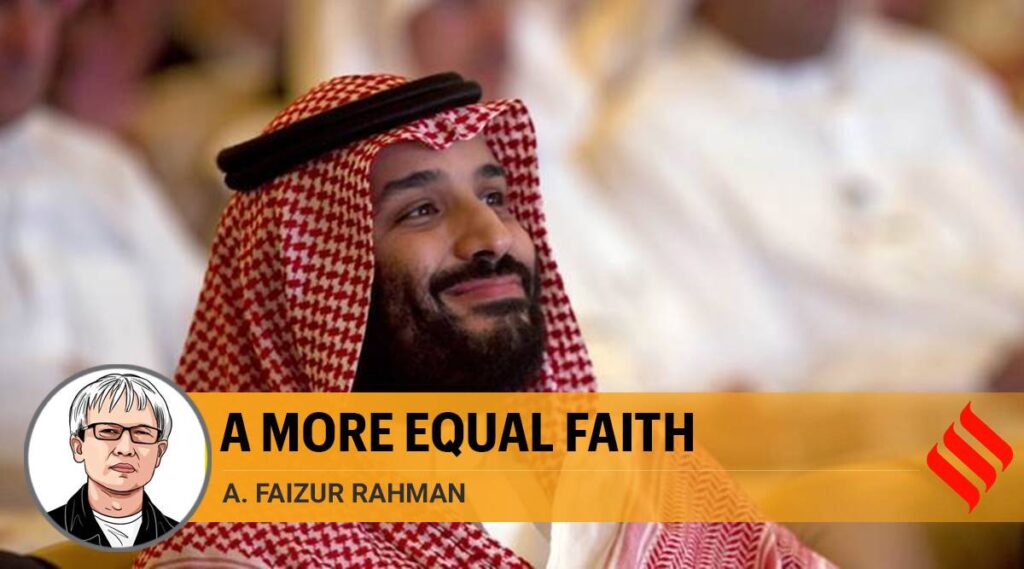There can be no doubt that these reforms signal a major theological shift, and if implemented successfully, will prove to be a watershed moment in the history of Sunni Islam.
Written by A. Faizur Rahman – February 17, 2021 : https://indianexpress.com/article/opinion/columns/islamic-law-women-welcome-reform-saudi-arabia-7191637/

It would appear from recent reports that Saudi Arabia’s crown prince, Mohammed bin Salman, is making good on his 2017 promise that he would return the country to a moderate Islam and “eradicate promoters of extremist thoughts.” Last month, The Washington Post disclosed that the kingdom had started purging its textbooks of anti-Semitic and misogynistic content, and this month Reuters revealed that four new laws — the personal status law, the civil transactions law, the penal code of discretionary sanctions and the law of evidence — are being finalised with the ultimate aim of codifying the entire Muslim law in consonance with the principles of shariah and best international practices. Saudi women have welcomed the move, with lawyer Dimah Al-Sharif expressing the hope that it will empower both women and society in general.
There can be no doubt that these reforms signal a major theological shift, and if implemented successfully, will prove to be a watershed moment in the history of Sunni Islam. The crown prince’s announcement is also a courageous attempt to break the state-ulema nexus that has been the cause of Muslim intellectual and economic backwardness for centuries — a fact convincingly exposed by scholar Ahmet T Kuru in his new book Islam, Authoritarianism and Underdevelopment. It was this nexus that buttressed the post-Prophetic Muslim expansionism started by Muawiya in 661 CE with the launch of the Umayyad Caliphate. Questionable traditions (hadiths) were fabricated in the name of the Prophet to scripturally entrench the dynastic ambitions of the ruling family. These hadiths otherised rival tribes and communities, and marginalised women.
Quran’s original Arabic text is free of misogyny and does not encourage any kind of ethnically directed hostility. In fact, it speaks of salvific inclusivity and shows respect for non-Muslim places of worship (2:62, 5:69, 22:40), besides inviting “people of the book” (an inclusive term for followers of all religions) to coexist peacefully on the basis of commonalities in their value systems (3:64).
If Muslims find themselves estranged from this equalitarian message, it is thanks to the havoc wrought over the centuries by exegetical interpolations which relied on dubious hadiths to introduce sectarian ideas into Quranic translations. For instance, an eschatological hadith in the collection Sahih Muslim attributes an anti-Jewish comment to the Prophet. Yet another hadith in Sahih Bukhari states that the Prophet considered women to be intellectually deficient because “the evidence of two women is equal to the witness of one man.”
The anti-Jewish statements attributed to the Prophet go against the verses mentioned above, and the misogynist hadith is based on a complete misunderstanding of the verse 2:282 which instructed Muslims of that period to have their legal agreements witnessed by two men, and “if two men are not available, then a man and two women witnesses of your choice so that if one of them errs (an tazilla), the other can remind her (fatu zakkira).”
A careful reading of this verse would show that there is nothing in it that alludes to the inferiority or the intellectual inadequacy of women. Thanks to centuries of suppression, women of that period were not conversant with the intricacies of business transactions. Islam sought to change this. Men were asked to accord legal status to women by recognising their right to give evidence which was so far denied to them.
The prescription that there may be two female witnesses in case a male witness is not available, was, therefore, a convenience given to women. The verse makes it clear that the second woman will come into play only if the first one “errs” and if she does not, then the transaction will be concluded with a male and a female witness.
This is proved by the fact that in three other contexts (4:15, 24:4, & 65:2), the Quran speaks of witnesses in gender-neutral terms. Put differently, the evidentiary stipulation mentioned in 2:282 was specific to those times, and only for legal or financial transactions. It cannot be generalised and made applicable in perpetuity to lower the intellectual or legal status of women.
One hopes that the historic attempt by Saudi Arabia to theologically defenestrate anti-Semitic and misogynist content, and codify the Muslim law in line with the egalitarian principles of the Quran will go a long way in restoring the Prophetic originality of Islam and influence Muslim societies across the world to do the same.
